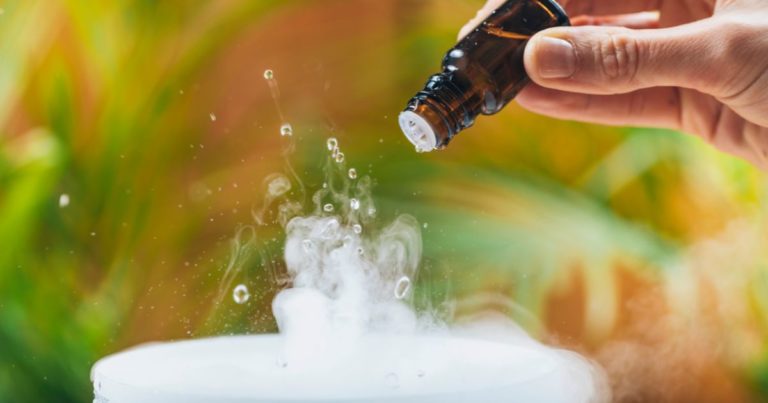Does a Humidifier Help With Snoring
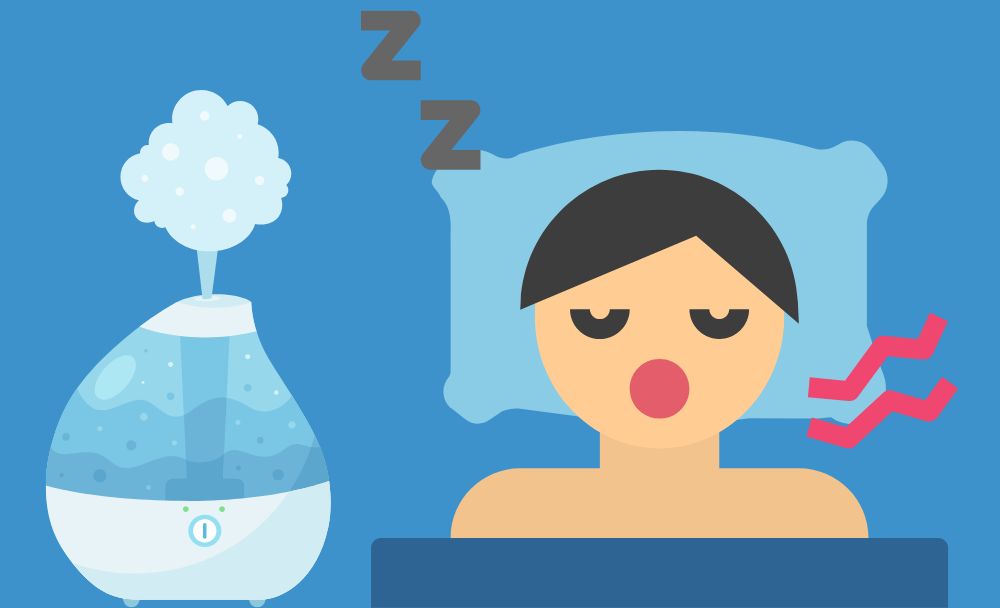
Perhaps you know someone whose snoring makes it impossible to get a quiet night. Or, maybe you are the one who is on the receiving end of snoring puns? Whatever it is, the hard fact is that snoring isn’t fun.
Approximately 57% of men and 40% of women in the US tend to snore while sleeping. It also affects 27% of all children in the country. From these numbers, it’s easy to conclude that snoring is widespread. Though it’s common, snoring may also be due to severe underlying sleep-related breathing disorders.
While advocates claim you can efficiently deal with snoring issues by using humidifiers, others find the claim arguable. What is the actual reason behind this debate? Does a humidifier help with snoring? Let’s find out.
Why Do People Snore?
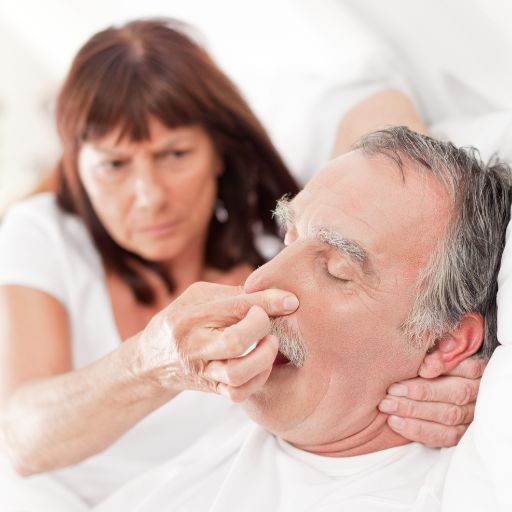
According to scientific or medical explanations, snoring happens when the tissues near the airway in the back of your throat rattle and vibrate. When you sleep, your muscles tend to relax, and consequently, it squeezes the airway. When you breathe, the inhalation and exhalation of air push the tissue to flutter.
As a result, a noise like roaring or flapping a piece of cloth in the breeze emerges, and we call it snoring. However, not everyone snores in the same way. For some, snoring occurs because of the shape of their neck muscles and tissues.
On the other hand, a few people may snore because of excessive tissue relaxation. Several factors can cause snoring, including but not limited to the following:
The Anatomy of the Mouth
A low, thick, soft palate typically blocks the airway. Besides, overweight individuals with excess tissues in their throats may also have narrowed down airways. In the same way, the triangular tissue that hangs from the soft palate (uvula) can block airflow when it elongates. All these factors may cause snoring.
Lack of Sleep
When you don’t get adequate sleep, it may lead to further nose relaxation, triggering snoring.
Alcohol
Excessive alcohol consumption before bedtime may lead to relaxed throat muscles. Besides, it reduces your body’s natural defense against airway obstruction.
Nasal Issues
Snoring may often occur because of chronic nasal congestion. It’s a condition that involves a crooked partition between the nostrils.
Sleeping Position
The effect of gravity on the throat may squeeze the airways. For this reason, you snore louder and more frequently when you sleep on your back.
Snoring May Be a Symptom of Sleep Apnea
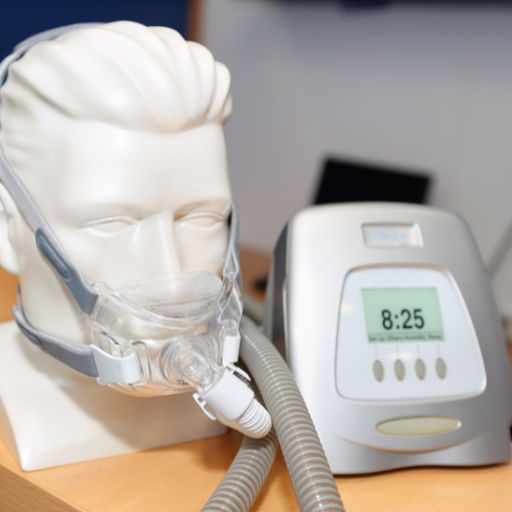
Mostly, snoring is harmless. However, it may often be related to a serious underlying sleep disorder called sleep apnea. This sleep-related breathing disorder causes you to pause and resume breathing while sleeping. There are several types of spleen apnea, and OSA, or Obstructive Sleep Apnea, is the most common among them.
It emerges when intermittently relaxed throat muscles block your airway. Sleep apnea might need medical help, and if it’s bad enough, you might need surgery. The symptoms of sleep apnea may include the following:
- Frequent mood swings
- Depression and irritability
- Loud snoring
- Unexplained daytime sleepiness
- Sore throat
- Dry mouth
- Lack of concentration
- High blood pressure
- Abnormal awakenings with choking and gasping
- Frequent morning headaches
- Reduced libido
Get Medical Attention for Sleep Apnea Symptoms
Sleep apnea may require immediate medical attention if you notice the following signs.
- Disruptive sleep and waking up choking or gasping
- Loud snoring that disturbs others’ sleep
- Paused breathing while sleeping
- Unbearable daytime sleepiness and a lack of energy
Sleep apnea causes significant sleep problems that make it hard to get to the most restful stages of sleep. You may not be aware of this broken sleep pattern, but you will face the consequences at some point.
The complications associated with sleep apnea may be mild like fatigue, headache and daytime drowsiness, to more severe like high blood pressure, cardiovascular disease, pulmonary hypertension, and stroke.
If you think sleep apnea may be a problem for you, please seek medical advice.
Does Dry Air Make You Snore?
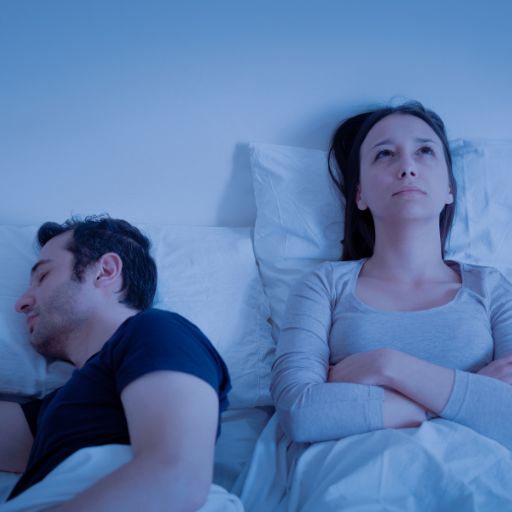
Dry air can be a major contributor to snoring. Understanding the link between dry air and snoring is essential for finding relief from this disruptive sleep disorder.
Low humidity in the bedroom can irritate and inflame nasal passages, making it difficult to breathe during sleep and increasing the likelihood of snoring.
This irritation causes your throat muscles to relax, leading to vibration of the soft tissues that produce snoring noises. In addition, if you have allergies or asthma, dry air can make symptoms worse which further contributes to an increased risk of snoring.
Measuring the humidity in your home is important when trying to reduce snoring due to dry air. You can buy a hygrometer for around $10 on Amazon. Place it near where you sleep and check it regularly; ideally, you want indoor relative humidity levels between 30% – 50%.
If levels are too low, consider investing in a humidifier that’s designed specifically for bedrooms—these often come with built-in hygrometers so you don’t need an additional device just for measuring moisture levels in the room.
There are also some simple tips that may help reduce snoring caused by dry air without needing any extra equipment:
- Drink plenty of water throughout the day;
- Use a saline spray before bedtime;
- Avoid alcohol close to bedtime;
- Keep pets out of your bedroom;
- Open windows slightly when possible, but not too much as cold drafts could wake you up.
- Try sleeping on one side instead of lying flat on your back as this position encourages better airflow through nasal passages while reducing vibrations associated with snoring sounds.
Dry air can cause snoring, but there are ways to reduce its effects. A humidifier may be the answer for those looking for relief from their snoring symptoms.
Does a Humidifier Help With Snoring?
Humidifiers and snoring share an outward connection. A Swedish study suggests that a humidifier may help people with sleep apnea stick with treatments, which help them keep their airways open at night.
Humidifiers moisten the air in the room, which aids in the reduction of throat irritation and nasal congestion. This further prevents the dry air from aggravating the nasal and throat issues. Eventually, it helps with reducing snoring and sleeping peacefully.
Who Can Use Humidifiers for Snoring?
It’s worth understanding that a humidifier doesn’t cure snoring. Instead, it creates an atmosphere that helps you get rid of excessive snoring. You can use humidifiers with other techniques and remedies to retain their best benefits.
Typically, humidifiers can address snoring caused by allergies, dry climates, pregnancy, and colds. They may also help sinus-driven snoring.
What Type of Humidifier Is Best for Snoring?
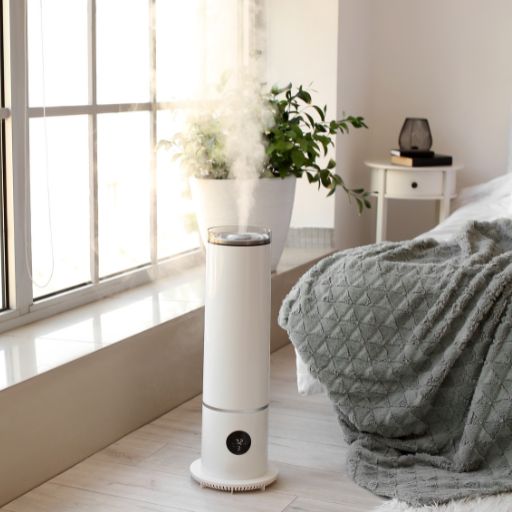
Humidifiers are available in two different types – warm mist and cool mist. However, the purpose of both types is the same: to add moisture to the air. They are different from each other because of a few functional factors.
Warm Mist Humidifiers
Warm mist humidifiers sport a heating element that boils water and makes steam. These humidifiers can increase the air temperature slightly but noticeably. Also, these humidifiers can effectively combat viruses and bacteria.
Moreover, they can achieve higher levels of moisture saturation. You can use these humidifiers for cough relief by pairing them with a few other therapeutic products.
Typically, warm mist humidifiers don’t come with an internal fan. Hence, they tend to operate quietly and peacefully. However, they may consume more energy.
You should avoid warm mist humidifiers with conditions like eczema.
Cool Mist Humidifiers
Cool mist humidifiers feature internal fans that evaporate water into the air. Naturally, this causes an effect of cooling. The device also boasts a cool water reserve and a wick filter. The filter draws the water and disperses it to the surroundings with the help of the fan.
Nowadays, you can even find ultrasonic cool mist humidifiers. They use high-frequency vibrations to disperse cool water, creating little water droplets.
The cool mist humidifiers are free from scalding risks, making them safe to use around pets and children. In addition, they consume less energy, and since they can lower the room temperature, they are best for warmer climates.
On the downside, cool mist humidifiers may cause fungi, bacteria, and mold accumulation. You need to ensure you keep them clean and replace any filters as required.
You can consider either a cool or warm mist when picking up the ideal humidifier for snoring. However, warm mist humidifiers may score higher in terms of convenience; they are quiet and easy to clean.
The Benefits of Sleeping With a Humidifier Overnight
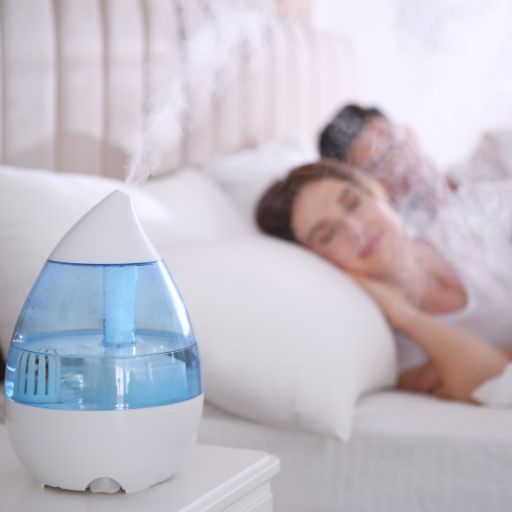
The benefit of using a humidifier is not limited to reducing snoring. This useful device offers a multitude of advantages. It helps you address the health issues associated with air dryness.
It’s worth knowing that your body needs moisture to function correctly. Lack of moisture may affect the functions of your body’s defense mechanisms.
This may lead to conditions like a stuffed nose, dryness of the throat and skin, cracking, respiratory issues, etc.
The other benefits of sleeping with a humidifier overnight include the following:
Helps Prevent Virus Transmission
Viruses can thrive and travel better in dry air. When you inhale the contaminated air, you expose yourself to the risk of infection. Therefore, you may consider using a humidifier to avoid the risk of virus-driven infections.
By moisturizing the room air, it obstructs virus and bacteria accumulation. Besides, a humidifier helps keep the respiratory passage moist.
Helps Alleviate Asthma Symptoms
Dry air causes lung irritation and constriction. This may be even more troubling for people with asthma. Often, dry air triggers asthma attacks. Therefore, air moisturization is pivotal for dealing with asthma.
Moisture allows the lungs to work better, helping you breathe without obstruction. Typically, 30-50% indoor humidity helps prevent asthma-related discomforts. To maintain this recommended level, you may rely on a humidifier.
Moist air soothes the lungs and air passages, hopefully preventing asthma attacks.
Reduces the Symptoms of Sleep Apnea
It can be challenging to sleep with sleep apnea. In this condition, however, humidifiers can be helpful. Typically, sleep apnea is treated with the help of CPAP machines. While most of these machines boast a built-in humidifier, they cannot offer the efficacy of the standalone ones.
Consider connecting a humidifier directly to your CPAP. By doing so, you can improve indoor air quality. In addition, you can retain the best effects of the CPAP treatment.
Sleep apnea symptoms like dry mouth, sinus infections, sore throats, and breathing problems can be aided with proper humidification. Even if you are receiving CPAP treatment, a lack of humidity may cause the conditions above.
How to Position a Humidifier in Your Bedroom
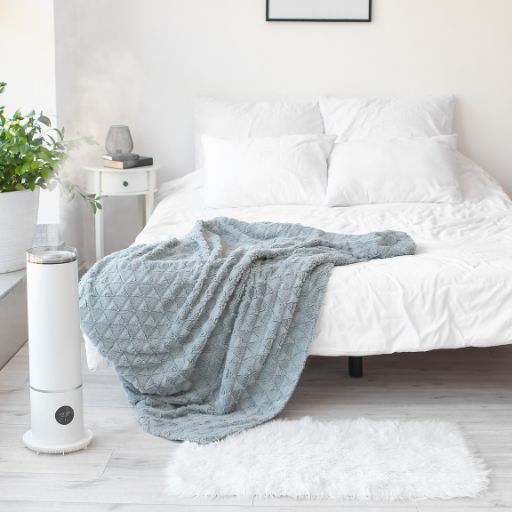
To use your humidifier efficiently and safely, you need to place it in the right position in your bedroom. Here’s how you can do so.
Place the Humidifier in a Place With Good Airflow
You should always place your humidifier on a nightstand or a table if it is a small, portable machine. For larger floor standing humidifiers, place it towards the end of the bed or in the center of the room.
It’s worth keeping in mind that a humidifier works as a singular source of higher relative moisture. Therefore, good airflow is essential to disperse the moisture throughout the room.
While a humidifier moisturizes the air in its usual vicinity, it creates a localized effect when the air stops moving. Therefore, ensure you put your humidifier in places like the conjunction of two windows or a door and a window.
Avoid Corners
Typically, the corners of your bedroom will experience the least airflow. In addition, they are usually more humid compared to the other parts of the room. Hence, you should always place your humidifier in the middle of the room.
Put it off the Ground
You should never place a humidifier directly on the ground. You should consider keeping them at least two to four feet off the ground to enjoy their best effects. Apart from better moisturization, it will also help you prevent the chances of water leakage.
When Does a Dehumidifier Help With Snoring?
Often, dehumidifiers may also help reduce snoring. If the humidity level in your bedroom reaches above 60%, you may need to consider a dehumidifier.
In these situations, dehumidifiers will also help you stop snoring and improve the quality of the air inside. Naturally, it will contribute to a better quality of sleep.
Do Essential Oils Help Reduce Snoring?
Essential oils are highly concentrated plant extracts. They contain uncountable active compounds that hold health-boosting and therapeutic properties.
By relieving sinus and nasal congestion, essential oils may help reduce snoring. Avoid putting essential oils into the humidifier water tank, as you can cause damage to the plastic and parts inside.
Frequently Asked Questions About Humidifiers and Snoring
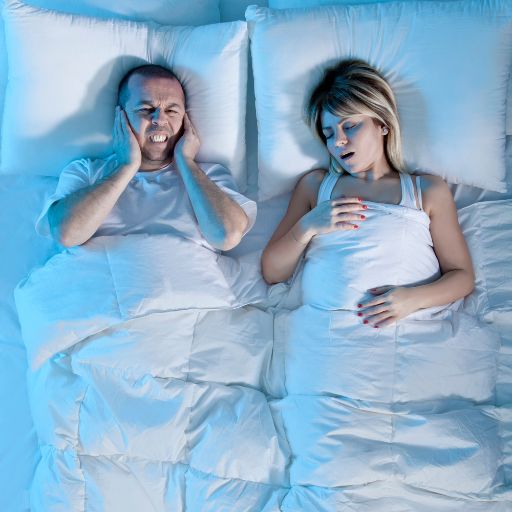
Will a Humidifier Prevent Snoring?
A humidifier may help with some of the symptoms associated with snoring, it is unlikely to prevent snoring entirely. If snoring is a persistent issue, it is important to speak with a healthcare professional to determine the root cause and develop an appropriate treatment plan.
Does a Cool Mist Humidifier Help With Snoring?
A cool mist humidifier may help with snoring by adding moisture to the air and reducing nasal congestion, which can be a contributing factor to snoring. It is important to note that a humidifier alone may not completely eliminate snoring, especially if the underlying cause of snoring is more complex such as sleep apnea.
What type of Humidifier is Best for Snoring?
Both warm mist and cool mist humidifiers can help with snoring. It is generally considered safer to stick with a cool mist humidifier in the bedroom at night, incase of accidental burns and injuries if you were to knock the machine over.
Can a Dry Room Cause Snoring?
Yes, a dry room can potentially contribute to snoring. When the air in a room is too dry, it can cause irritation and inflammation in the nasal passages and throat, leading to congestion and snoring. Using a humidifier to add moisture to the air can help alleviate dryness and potentially reduce snoring caused by dry air. If snoring persists, it is important to speak with a healthcare professional.
Is it Bad to Sleep With a Humidifier Every Night?
Sleeping with a humidifier every night is generally safe as long as it is used properly and cleaned regularly. Try to choose a humidifier that has a built in hygrometer and a setting controlling humidity, so you don’t over humidify your room.
Should I Put a Humidifier Next to the Bed?
Place your humidifier on a level surface approximately 3 feet away from your bed. Make sure you the mist isn’t aiming at bed linen, walls, curtains or other furniture that may be damaged by excessive moisture.
How Long Should You Run a Humidifier at Night?
As a general guide, running a humidifier for 7-8 hours at night is considered safe. This time can vary based on the size of your room, size of the humidifier, and humidity levels. Always use a hygrometer to check the level of humidity and turn off the humidifier if it exceeds 50%.
Conclusion
Snoring is not only annoying, but it can also indicate sleep disorders such as sleep apnea.
While a humidifier can help reduce the symptoms of snoring and help you (and your partner) get better sleep, it is important to seek the advice of a health professional to determine the underlying cause of snoring.
Please don’t self diagnose – sleep apnea is a serious condition with other complications, all of which can shorten your life. Please seek medical advice.
- Can You Use a Steam Mop On Karndean Flooring? - June 19, 2024
- How To Clean Unsealed Concrete Floors - June 7, 2024
- How to Clean Stamped Concrete - June 7, 2024

